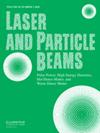基于介质阻挡放电的氩冷等离子体射流模态分析
IF 1.9
4区 物理与天体物理
Q4 PHYSICS, APPLIED
引用次数: 1
摘要
本文采用基于有限元方法的COMSOL Multiphysics对常压介质阻挡放电氩等离子体射流进行了建模。利用COMSOL多物理场代码的流体动力学和等离子体模块对等离子体射流进行建模。通过改变电参数,即在静态和氩气流动两种情况下的供电电压和供电频率,研究了等离子体参数,如电子密度、电子温度和电势。氩气流量固定为1l /min。环形电极排列受供电频率(10-25千赫)和供电电压(3.5-6千伏)范围的影响。对环形电极结构的实验结果与仿真分析结果进行了比较。这些结果有助于建立基于介质阻挡放电的冷等离子体射流在辉光放电状态下无电弧现象的最佳工作范围。对于施加电压和电源频率参数,发现放电一致均匀,并表现出常压辉光放电的特征。本文章由计算机程序翻译,如有差异,请以英文原文为准。
Modal analysis of dielectric barrier discharge-based argon cold plasma jet
In this study, an atmospheric pressure dielectric barrier discharge-based argon plasma jet has been modeled using COMSOL Multiphysics, which is based on the finite element method. The fluid dynamics and plasma modules of COMSOL Multiphysics code have been used for the modeling of the plasma jet. The plasma parameters, such as electron density, electron temperature, and electrical potential, have been examined by varying the electrical parameters, that is, supply voltage and supply frequency for both cases of static and with the flow of argon gas. The argon gas flow rate was fixed at 1 l/min. Ring electrode arrangement is subjected to a range of supply frequencies (10–25 kHz) and supply voltages (3.5–6 kV). The experimental results of the ring electrode configuration have been compared with the simulation analysis results. These results help in establishing an optimized operating range of the dielectric barrier discharge-based cold plasma jet in the glow discharge regime without arcing phenomenon. For the applied voltage and supply frequency parameters examined in this work, the discharge was found to be consistently homogeneous and displayed the characteristics of atmospheric pressure glow discharge.
求助全文
通过发布文献求助,成功后即可免费获取论文全文。
去求助
来源期刊

Laser and Particle Beams
PHYSICS, APPLIED-
CiteScore
1.90
自引率
11.10%
发文量
25
审稿时长
1 months
期刊介绍:
Laser and Particle Beams is an international journal which deals with basic physics issues of intense laser and particle beams, and the interaction of these beams with matter. Research on pulse power technology associated with beam generation is also of strong interest. Subjects covered include the physics of high energy densities; non-LTE phenomena; hot dense matter and related atomic, plasma and hydrodynamic physics and astrophysics; intense sources of coherent radiation; high current particle accelerators; beam-wave interaction; and pulsed power technology.
 求助内容:
求助内容: 应助结果提醒方式:
应助结果提醒方式:


